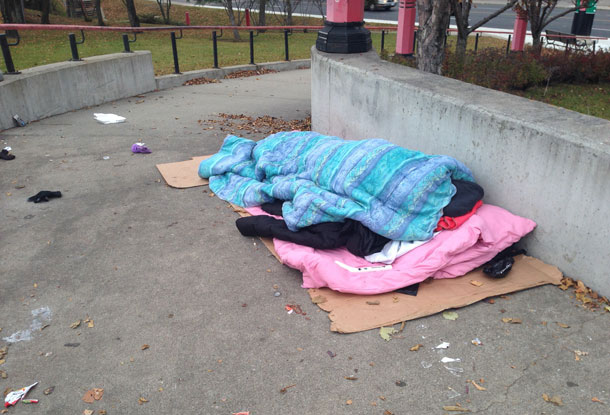
By Niigaan Sinclair
WINNIPEG – OPINION – For me, Thursday’s events started with a chance meeting on New Year’s Eve.
“Hey, professor,” said a familiar voice, one that had greeted me every morning in my first-year introduction to native studies class.
It was Jeff (not his real name), a University of Manitoba student from Sagkeeng First Nation. I had lost touch with him, gone among the thousand other faces that came after.
But, here he was, in front of me, on New Year’s Eve, in a small tent city.
That night I was walking with Mama Bear Clan, delivering food and warm clothing to the dozens who sleep outside on Henry Avenue and Martha Street.
Walks with Mama Bear Clan are always emotional. It’s front-line work with some of Winnipeg’s most marginalized. It’s also challenging because it’s Canada’s history of violence laid bare. Winnipeg’s “homeless” consists almost exclusively of Indigenous people, and some I’ve known since the 1990s (working in street-level mental health services).
Seeing a young Ojibwa guy I had taught however, struck me deeply. Jeff had lost a lot of weight; his face looked like it had experienced a few rough years. He was smiling at me, though.
We talked for a few minutes. I offered him gloves and a sandwich. I badly wanted to ask how he got here, but that was his business. Then, we hugged.
“Bye, professor,” he said, walking away.
“Call me, man. Any time,” I responded, giving him my phone number and the money I had in my pocket. He laughed, and told me he didn’t have a phone.
Then, he hugged me again.

I started crying.
“I’ll find you, professor,” he said, comforting me.
Despite other walks with the Mama Bear Clan since, I haven’t seen Jeff.
I looked for him again Thursday afternoon, after I heard officials from the City of Winnipeg had ordered the removal of the tent city.
For months, more than 15 homes have been built near Main Street Project and the Salvation Army. Residents say that around 60 people live at the outdoor site, on and off. Some tents house heaters, lights, and candles.
It’s not the first tent city in Winnipeg, but it’s been probably the most visible — which is likely why it’s received the most scrutiny.
After a cold snap in November, a downtown advocacy group called the Urban Knights and Ladies partnered with students and staff from Stonewall Collegiate to build the community two warming huts. Made of plywood, the Knights hoped to provide a safe, warm place for relief on cold nights.
Days after they were installed, police removed the huts, arguing they violated fire codes and bylaws.
This prompted advocates to donate newer tents and a teepee, as a mid-December cold wave dropped temperatures to life-threatening degrees.
Just before Christmas, elder Walter Richard donated a second teepee in honour of his nephew, Matthew Sutherland, who was part of Winnipeg’s downtown community before he was killed Oct. 31. It became known as “Matthew’s Place” and housed a sacred fire and ceremonies.
On Jan. 3, there was a small fire in one tent (caused by a candle), damaging one teepee and resulting in one person taken to hospital.
On Tuesday, Matthew’s Place burnt down. Residents say it got too cold to constantly man the fire inside. No one was hurt.

Activists immediately promised to rebuild the structures but city officials announced an end to the community. On Thursday, construction crews began removing all structures and possessions and promised to finish the job Friday.
By the time I got to the site, around two-thirds of the homes had been removed. Bulldozer tracks were everywhere. Possessions were strewn around, alongside single shoes and ripped jackets. In the snow, I found a bubble pack of pills belonging to Farron (in case anyone knows him, his medicine is at Main Street Project).
Where Matthew’s Place once stood was a tiny replica teepee, a small expression of resistance and a reminder of the life in tent city.
It wasn’t a bunch of squatters. It was a place people could go when governments, politicians, and everyday Winnipeg cast them aside or, worse, forgot about them.
It was a home.
I spent the afternoon visiting organizations. I found no place to sit in Main Street Project. They were so busy at the Salvation Army, staff working overtime. The North Point Douglas Women’s Centre — an organization suffering from provincial funding “reorganization” — opened on a day it usually doesn’t.
I called politicians and — if they responded — I asked where the former residents of tent city should go. Most said existing shelters.
I asked them if they had ever spoken to those citizens who told me how unsafe, crowded, and unsuitable many shelters are. I asked them about any new commitments to deal with the mental health needs, safety, or housing needs now created.
I asked them what was the plan now.
Their silence was deafening. I could hear utter, complete heartlessness though.
I spent the rest of the night looking for Jeff.
If you read this, I’ll find you, man.
I’m sorry we failed.
 Niigaan Sinclair
Niigaan Sinclair
Originally appeared in the Winnipeg Free Press on January 16, 2020. Republished with the permission of the author.
The views, opinions, and positions expressed by all columnists and contributors are the author’s alone. They do not inherently or expressly reflect the views, opinions and/or positions of NetNewsLedger.




